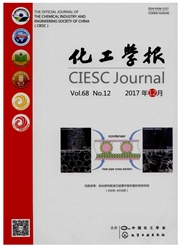

 中文摘要:
中文摘要:
海藻酸钙胶囊膜由于具有制备过程温和环保、材料生物相容性优良等优点,广泛应用于生物医药等领域。薄壁结构的胶囊膜可减小跨膜传质阻力,加速囊膜内外物质的交换,因而备受学术界和工业界的广泛关注。近年来,具有超薄壁结构的海藻酸钙胶囊膜的制备与改性成为一个研究热点。本文综述了超薄壁结构海藻酸钙胶囊膜的制备方法及其功能化的研究新进展,重点介绍了利用共挤出毛细管装置制备超薄壁结构的海藻酸钙胶囊膜、利用精蛋白吸附与仿生硅化技术对超薄壁结构海藻酸钙胶囊膜的有机/无机杂化处理,以及利用复合纳米响应性凝胶颗粒的方法和接枝响应性聚合物高分子的方法实现超薄壁结构海藻酸钙胶囊膜的功能化改性等方面的研究现状。
 英文摘要:
英文摘要:
Calcium alginate (Ca-alginate) capsule membranes are widely used in biological and medical fields due to their notable advantages such as good biocompatibility, and mild gelation conditions. Thin capsule membranes are desired to reduce the resistance to the mass transfer across the membranes, and to accelerate the exchange of solutes between the internal space of the capsule and the external environment. Therefore, fabrication and functionalization of Ca-alginate capsules with ultrathin membranes have attracted much attention recently. This paper reviews recent progress in fabrication and functionalization of Ca-alginate capsules with ultrathin membranes, and the controllable fabrication of Ca-alginate capsules with ultrathin membranesvia a co-extrusion approach, organic/inorganic hybrid processingvia adsorption of protamine molecules and biosilicification as well as functional modification of the Ca-alginate capsules with ultrathin membranes are highlighted. The thicknesses of the resultant Ca-alginate capsule membranes range from 0.6 to 150 μm, and the permeability performance of the capsule membranes could be controllably adjusted. The strategy reported in this paper provides a novel approach to fabricate novel structures of capsule membranes for various applications, particularly as a new tool for screening microorganism survival and growth in three-dimensional environments. Protamine is used to inspire andtemplate silica formation onto the surfaces of the Ca-alginate capsules, which provides a facile and efficient method to prepare the organic/inorganic hybrid capsules with ultrathin membranes. The Ca-alginate/ protamine/silica capsules efficiently inhibit the swelling of Ca-alginate capsules, and thus are promising carriers for encapsulation of cells and enzymes. In addition, Ca-alginate capsules membranes blended with poly(N-isopropylacrylamide) (PNIPAM) nanogels exhibit desirable thermo-responsive gating characteristics. pH-Responsive switching functions can be endowed by the electrostatic in
 同期刊论文项目
同期刊论文项目
 同项目期刊论文
同项目期刊论文
 期刊信息
期刊信息
